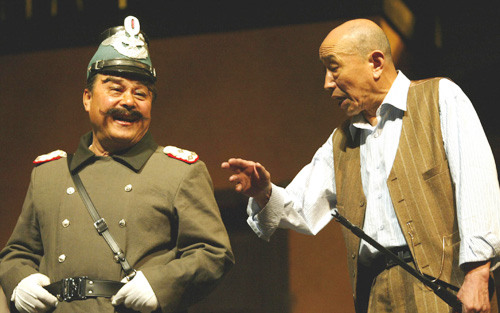|
 |
|
GERMAN PLAY: Beijing People's Art Theatre brings German drama The Butcher to the Chinese stage in 2005, starring Zhu Xu (right) (CFP) |
"This motto inspires our team to have a reverence for art and aspire to excellence in their performances," said Ren Ming, one of the directors of Jia Zi Yuan and Vice President of BPAT.
Indeed, pursuit of excellence has penetrated into every facet of the organization's art direction.
The exquisite shows are possible thanks to hard practice and strict attention to detail, said Cui Ning, another Vice President of BPAT.
Depending on the actors' experience level, it generally takes about 10 days to memorize a drama script. But the theater's policy is to rehearse for 60 days before the release of a new drama. Thus, the actors have to recite the lines repeatedly until they are totally immersed in the story.
"Art always comes first" is followed by another mantra within the theater: "There can be no lines, but mustn't be no performance." Shu Xiuwen, an old playwright, has exemplified this artistic ethic throughout her long career. In the 1950s, she was already a top performer. But when she performed in a Soviet drama called The Man With a Gun, she was willing to play a small non-speaking role as a secretary.
Few thought the role left any room for creativity, but she made it possible. Rather than mechanically "ticking" on the typewriter, she altered the noises of the typing sounds for the stage.
Of the 100-year history of the Chinese drama, BPAT represents half of its history. The group's masters, excellent works and outstanding actors lent the theater a unique status as a legend in the artistic community.
According to theater lore, the organization's success is owed in large part to a 42-hour-long discussion of the four founders several days after the theater was established.
"Those 42 hours were so important because it determined the appearance and direction of the organization in the following 60 years," said Xie Xizhang, a Chinese cultural critic.
Shortly after the theater was founded in 1952, the four leaders of the organization—President Cao, Vice President Jiao Juyin (1905-75), Vice President Ouyang Shanzun (1914-2009) and Party Secretary Zhao Qiyang (1918-96) held a marathon brainstorming session. The four were China's leading dramatic artists of the day.
After the exhausting debate, they agreed on the theater's mission: To build BPAT into a world-class institution with its own unique style and theoretical system as well as distinguished national characteristics, much like Russia's Bolshoi Theatre.
The theater staff has stayed true to the founders' ideals, continually pushing the theater forward in today's rapidly changing society.
Creative realism is a prominent style of the theater. An example was the performance of Long Xu Gou 50 years ago, in a drama written by China's great writer Laoshe (1899-1966). The play told a story about how the government handled the Longxugou drainage ditch and improved local people's life.
To understand the reality of the characters in the drama, the production team went to Longxugou, a drainage ditch in the south of downtown Beijing where the story was set. The performers saw firsthand how residents of that area lived, and went on to present a vivid show.
The successful performance of Long Xu Gou not only illustrated the fate of a group of ordinary people, but also set a standard for the theater in its pursuit of realistic portrayals of everyday life in China.
| 